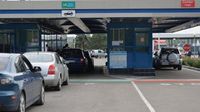In a significant surge of travel across its borders, Moldova and Romania are seeing a notable increase in border crossings as well as necessary enforcement measures. In just 24 hours, Moldova's border authorities recorded a remarkable 37,517 crossings at various points of entry as of March 19, 2025. This influx underscores both the busy nature of these entry points and the ongoing challenges of border security, particularly given the recent geopolitical developments in the region.
The busiest crossing was at Chisinau International Airport, where 9,420 individuals traversed its gates. Other notable entry points included Leuseni with 5,494 crossings, Sculeni with 4,100, Otaci with 3,441, and Palanca recording 2,739 crossings. However, this spike in crossings has been accompanied by regulatory enforcement, as 29 foreign citizens were denied entrance into Moldova during the same period, underscoring ongoing vigilance by border officials.
In addition to the refusals of entry, authorities noted several violations occurring at the Moldovan border. Among these were the illegal crossing of the state border by two individuals, one instance involving the use of a false document, and several breaches of entry and stay regulations. In total, border police reported nine violations related to state border regime adherence. These figures indicate a proactive stance from authorities amidst rising border mobility.
To further manage the volume of traffic and prevent congestion at border crossing points, the Moldovan Border Police issued recommendations for travelers. Alternative routes have been suggested, such as using the Leova-Bumbăta checkpoint instead of Leușeni-Albița, or Costești-Stânca as an alternative to Sculeni-Sculeni. Travelers aiming to use the Palanca crossing were advised to consider the Tudora-Starokazacie route.
In Romania, alongside Moldova, border activity has followed a similar upward trend. On March 18, 2025, Romanian border police processed approximately 47,200 individuals and a further 12,300 vehicles at the external border, which encompasses borders shared with Serbia, Moldova, and Ukraine, along with maritime and air routes from outside the Schengen area. Of those processed, 23,772 individuals and 6,229 vehicles entered Romania.
In a remarkable statistic for the period from February 10, 2022, to March 18, 2025, Romania recorded the entry of over 11.3 million Ukrainian citizens, indicating the ongoing migration trends that have been significantly influenced by conflict and instability in Ukraine. This influx has heightened the need for stringent border controls and thorough checking processes to maintain security and regulatory compliance.
A major shift in border protocol occurred in Romania on January 1, 2025, when internal border checks with Hungary and Bulgaria were eliminated. This policy allows for smoother travel within the Schengen Area, enabling citizens to move freely. However, Romanian border police retain the authority to conduct random checks within 30 kilometers of internal borders, employing mobile terminals connected to national and Schengen databases. In the past 24 hours, over 9,300 such checks have been carried out.
Alongside these proactive measures, Romanian border officials have reported that 92 illegal acts were discovered in the last 24 hours. This comprised 27 offenses and 65 contraventions, leading to fines totaling 50,827 lei. Additionally, goods valued at over 1,038,200 lei were seized to protect consumer interests and uphold trade regulations. The crackdown has also seen the denial of entry to 25 foreign nationals who did not meet legal entry criteria, alongside six Romanian citizens being prevented from exiting the country for various legal reasons.
The Romanian Border Police stated, "We are here daily to facilitate transit across borders while ensuring legal compliance." The ongoing enforcement actions highlight a robust commitment by authorities to adhere to national laws and keep border security tight amid evolving international dynamics.
As both Moldova and Romania navigate increasing traveler numbers and the related complexities, the collaboration between bordering nations is particularly crucial. Each country remains focused on security and regulatory compliance, ensuring that both citizens and travelers experience safe transit through their borders.
In light of the complicated security environment, citizens are encouraged to stay updated on border conditions, wait times, and crossing protocols. Real-time information is available through various online channels designed to assist those traveling in and out of these regions.






